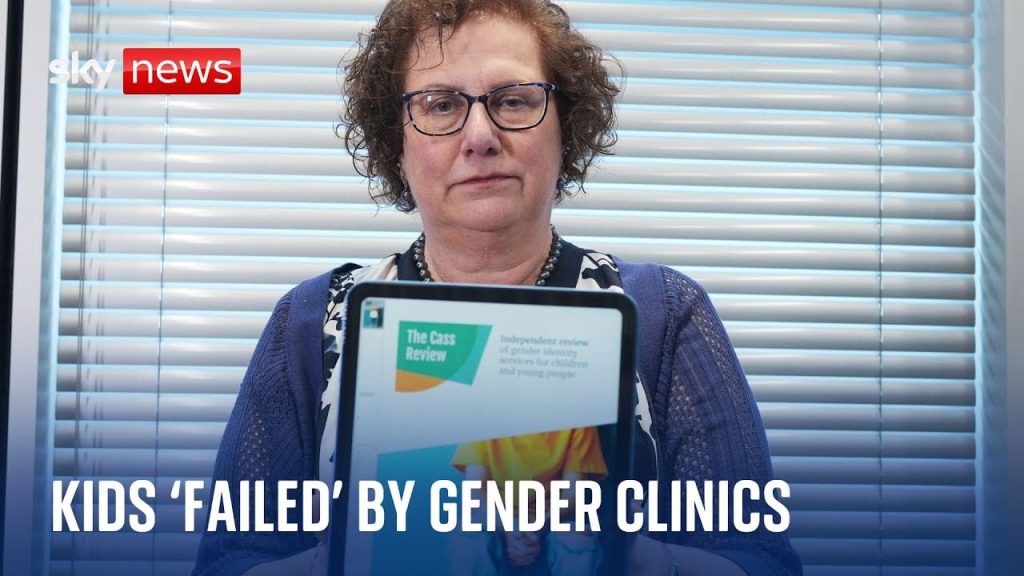Pediatrician and consultant Hilary Cass conducted a comprehensive and lengthy review of international research into gender medicine for children for NHS England. She concludes that a lack of research and evidence on transgender medical interventions such as puberty blockers and body-altering surgeries is failing children.
“The pillars of gender medicine are ‘built on shaky foundations,’” Dr. Cass has said, and evidence was found to be severely lacking on the impacts of puberty blockers and hormone treatments on children.
Dr. Cass further stated that healthcare for people questioning their gender “needs to be improved across the board.” Still, there is a marked and essential distinction “between having a trans identity and medically transitioning.”
In a piece for the British Medical Journal (BMJ), Dr. Cass stated that while medicine is usually based on the pillars of integrating the best available research evidence with clinical expertise and patient values and preferences, she “found that in gender medicine those pillars are built on shaky foundations”.
In compiling the comprehensive report, she envisioned a six-month part-time review. But it became a “24-hour-a-day obsession to try to help improve things.”
Cass’s prior findings led to the banning of puberty blockers from children outside of clinical research in the UK.
Overview of key findings in the final report:
There is no simple explanation for the increase in the numbers of predominantly young people and young adults who have a trans or gender diverse identity, but there is broad agreement that it is a result of a complex interplay between biological, psychological and social factors. This balance of factors will be different in each individual.
There are conflicting views about the clinical approach, with expectations of care at times being far from usual clinical practice. This has made some clinicians fearful of working with gender-questioning young people, despite their presentation being similar to many children and young people presenting to other NHS services.
An appraisal of international guidelines for care and treatment of children and young people with gender incongruence found that that no single guideline could be applied in its entirety to the NHS in England.
While a considerable amount of research has been published in this field, systematic evidence reviews demonstrated the poor quality of the published studies, meaning there is not a reliable evidence base upon which to make clinical decisions, or for children and their families to make informed choices.
The strengths and weaknesses of the evidence base on the care of children and young people are often misrepresented and overstated in scientific publications and social debate.
The controversy surrounding the use of medical treatments has taken the focus away from what individualized care and treatment are intended to achieve for individuals seeking support from NHS gender services.
The rationale for early puberty suppression remains unclear, with weak evidence regarding the impact on gender dysphoria and mental or psychosocial health. The effect on cognitive and psychosexual development remains unknown.
The use of masculinising / feminising hormones in those under the age of 18 also presents many unknowns, despite their longstanding use in the adult transgender population. The lack of long-term follow-up data on those commencing treatment at an earlier age means we have inadequate information about the range of outcomes for this group.
Clinicians are unable to determine with any certainty which children and young people will go on to have an enduring trans identity.
For most young people, a medical pathway will not be the best way to manage their gender-related distress. For those young people for whom a medical pathway is clinically indicated, it is not enough to provide this without also addressing wider mental health and/or psychosocially challenging problems.
Innovation is important if medicine is to move forward, but there must be a proportionate level of monitoring, oversight and regulation that does not stifle progress, while preventing creep of unproven approaches into clinical practice. Innovation must draw from and contribute to the evidence base.
You can read the full report here.
Author J.K. Rowling offered insight into the implications of the study.
Over the last four years, Hilary Cass has conducted the most robust review of the medical evidence for transitioning children that’s ever been conducted. Mere hours after it was released to the press and public, committed ideologues are doubling down. 1/6 https://t.co/J4fA4JYgkC
— J.K. Rowling (@jk_rowling) April 10, 2024
Whining by child mutilation fans led to a brutal community note on X.
Chair of the Chair of Scottish Labour Students, Emma Russell, wrote on X, “The Cass Review is a methodologically flawed, ideologically led study that isn’t worth the paper it’s printed on. The Labour Party, and Wes Streeting, must stand against the erosion of trans rights and trans healthcare provisions. This is absolutely vital.”
Community notes hit back hard, “Far from being ‘methodologically flawed’ and ‘ideologically led’ the study by Dr Cass has been 4 years in the making and was conducted by a former President of the Royal College of Paediatrics and Child Health. The poster is the idealogue.”
Watch:
The post UK Report: Children Are ‘Failed’ by Gender Clinics and Lack of Research and Evidence for Transgender Medical Interventions appeared first on The Gateway Pundit.





